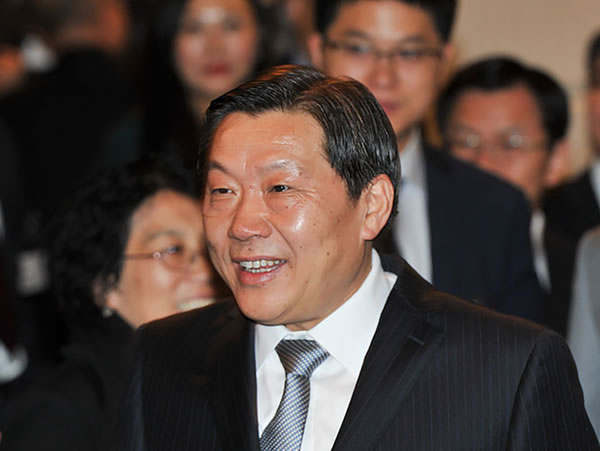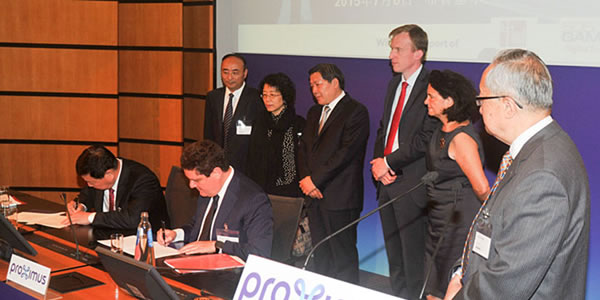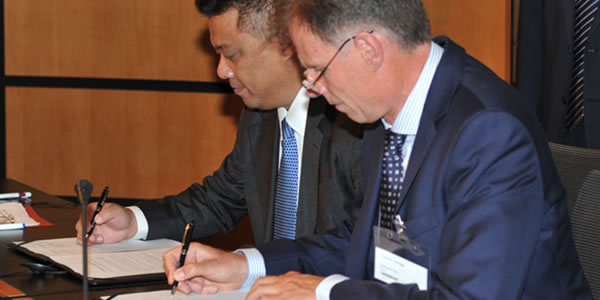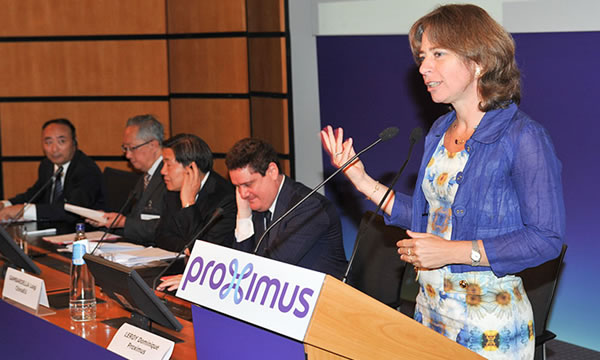Lu Wei: European Companies are Welcome in China’s Fast Growing Internet Market
A joint China-EU Center for Research on Internet Policies and Strategies will be set up
On Monday, July 6th, ChinaEU together with the Internet Society of China (ISC) convened the first China-EU Digital Cooperation Roundtable, bringing together over 50 representatives of the leading Chinese and European ICT and banking companies. The special guest of the day was Minister Lu Wei, China’s top Internet regulator.
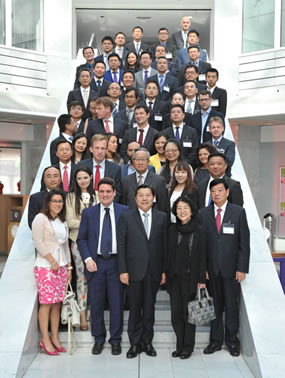 “This is an event of historic importance in the relationship between Europe and China in the Internet, telecom and High-tech fields. I expect a quality leap in the digital cooperation between the two sides, following this exceptional meeting” underlined in his opening speech Luigi Gambardella, President of ChinaEU. “We are very proud to have succeeded in our ambition to bring Lu Wei to Europe for his very first visit to the EU’s capital.”
“This is an event of historic importance in the relationship between Europe and China in the Internet, telecom and High-tech fields. I expect a quality leap in the digital cooperation between the two sides, following this exceptional meeting” underlined in his opening speech Luigi Gambardella, President of ChinaEU. “We are very proud to have succeeded in our ambition to bring Lu Wei to Europe for his very first visit to the EU’s capital.”
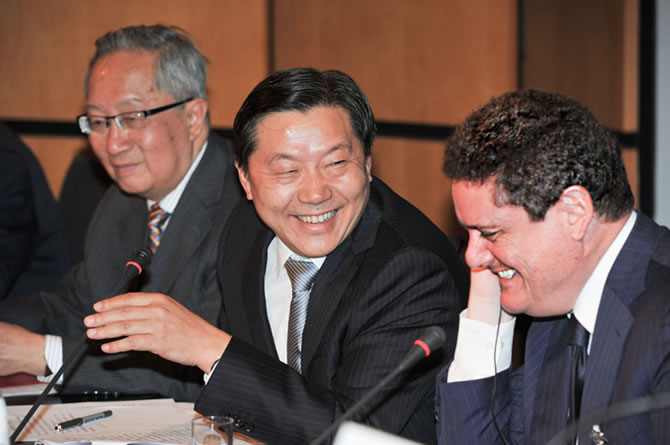
From left to right: Gao Xinmin, Vice President of the Internet Society of China, Lu Wei, Director of the Cyberspace Administration of China, and Luigi Gambardella, President of ChinaEU
Minister Lu Wei is a key figure in China’s Internet landscape. He is the Director of the newly formed Cyberspace Administration of China (CAC) and the Head of the State Council Central Leading Group for Internet Security and Informatization –a body under the direct leadership of China’s President Xi Jinping. Despite his very limited availability for overseas travels, Lu Wei accepted ChinaEU’s invitation to come to Brussels. His trip reflects the importance of Europe in China’s brand-new digital strategy.
This exceptional visit to the decision-making center of the EU complements a previous trip to the Silicon Valley, where Minister Lu has been warmly welcomed by US tech giants Google, Apple, Facebook, Yahoo, Microsoft and Amazon.
A number of senior executives traveled together with Minister Lu, including the famous BATs (Baidu, Alibaba and Tencent), the big four telcos (China Mobile, China Telecom, China Unicom and Dr Peng Telecom and Media Group), China’s biggest vendors ZTE and Huawei, tech star Xiaomi, and software providers Qihoo 360 and Cheetah Mobile. ICBC, the world’s largest bank, also attended the meeting.
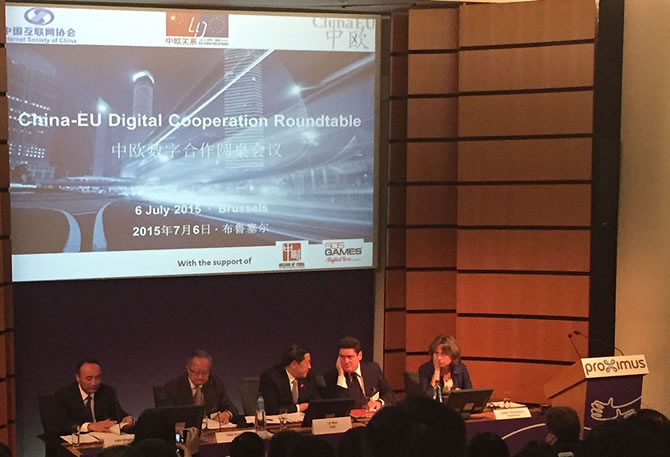
From left to right: Fan Qingfeng, Vice President of ZTE, Gao Xinmin, Vice President of Internet Society of China, Lu Wei, Director of the Cyberspace Administration of China, Luigi Gambardella, President of ChinaEU, and Dominique Leroy, CEO of Proximus
The European telecom industry was represented by BT, Deutsche Telekom, Hutchinson Wampoa, Proximus, Telecom Italia and Telekom Austria, as well as SES Satellites and Eutelsat. European Internet companies were represented by the new rising star Digital Bros and NMusic. In addition, there were representatives from Vivendi, SAP, Nokia, Deutsche Post DHL, GSMA, and high-tech startups Live Mobile and INNOVACOM. Senior representatives of HSBC and Barclays also participated to the discussions.
The bottom line was very strong will from both the institutional level and the business side to deepen dialogue and take concrete action to boost all-round cooperation, in areas ranging from research & development in new technologies -including next generation mobile technology (5G), mutual investments in next generation networks infrastructure and innovative services, Internet-related sectors -including big-data, cloud computing, e-commerce- to joint development of new high tech startups.
Lu Wei expressed his sincere support for ChinaEU and its efforts to align Europe and China in cyberspace issues. He encouraged European and Chinese businesses to join hands for the creation of a “digital Silk Road”. He explained: “The Cyberspace Administration of China is committed to promoting dialogue and cooperation between China and the EU in digitization, information technology and cyberspace, in order to support Chinese Internet companies to come to Europe, as well as to encourage European companies to enter and navigate China’s fast growing Internet market. China and the EU should combine their digitization processes and exploit the complementarities of each other’s competitive advantages: innovative technology in Europe and a huge market in China. Between Europe and China there are still 800 million people uncovered by the Internet, and that is precisely the potential market of the China-EU cooperation in the Internet field.”
Answering to a Chinese journalist who voiced European companies’ concerns of unfair treatment in China, he made it very clear that “China welcomes companies from all over the world, provided that they respect Chinese law, that is, safeguard China’s national security and guarantee the interests of Chinese consumers. China welcomes and encourages European Internet companies to develop in China and protects their legitimate interests in the same way it protects Chinese local companies.” He invited foreign companies who feel unfairly treated to report specific cases to himself.
Gao Xinmin, Vice President of the Internet Society of China, said: “China and Europe have very similar digital dreams, China’s “Internet Plus” initiative, aimed at digitalizing every single sector of the Chinese economy, and Europe’s ambition of creating a strong digital single market across the 28 member states. Both sides wish to leverage the digital economy to upgrade their economic models.”
It is clear from the conclusions of the EU-China Summit that the wiliness for digital collaboration is two-sided. Huang Yiyang, Head of the Political Section of the Chinese Mission to the EU, made an important consideration: “this was the first time that the expression “digital economy” appeared in the conclusions of a EU-China Summit, signaling the acknowledged strategic importance the sector plays in the bilateral relationship. Another important achievement of the leaders’ meeting was the commitment to establish a joint investment fund to connect China’s One Belt, One Road initiative with the EU’s 315bn euro investment plan.” We can well expect to see many important business opportunities arising from such political announcement, and a consistent part of the cake may go to the digital economy.
At the presence of Minister Lu and China’s Ambassador to the EU Mrs Yang Yanyi, ChinaEU signed a letter of intent with China Internet Development Foundation (CIDF), the highest-level national public-raising foundation to promote international Internet communication, Internet security and informatization cooperation. The two organizations committed to working on the delivery of five concrete cooperation mechanisms between Europe and China in the digital field, including the establishment of a China-EU Center for Research on Internet Policies and Strategies, the creation of an Industry Taskforce on the EU Investment Plan and China’s One Belt, One Road initiative and the set up of a database for smart cities. o to the digital economy.
China Unicom and Nokia signed a Memorandum of Understanding to deepen their technological cooperation in the next five years.
There was a general consensus from the industry that more dialogue is needed among the two business communities and the respective governments.
Sylvie Forbin, Senior Vice President of Public and European Affairs of Vivendi –one of the largest media companies in the world– raised an interesting idea: “One of the key factors of success for the digital cooperation between China and Europe relies on trustworthy partnerships between Chinese websites players and European rights owners. As an experimental step, why not imagine a comprehensive offer of European films covering a range of European cinema history that would be disseminated on line for the Chinese consumers? Such a project might be aggregated in Europe, along with a guiding tool, of course both in original and Chinese version, enriched with metadata.”
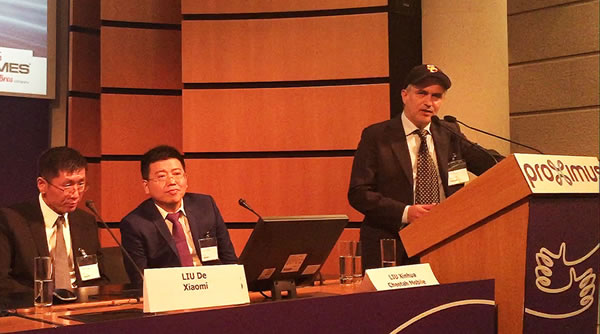
From left to right: Liu De, Vice-President of Xiaomi, Liu Xinhua, Chief Marketing Officer of Cheetah Mobile, and Raffaele Galante, CEO of Digital Bros
“In view of our worldwide expansion, China is a priority for Digital Bros in 2015. I believe that our Group will be a truly global company when we will have our roots in China and Asia, after consolidating our presence in Europe and the US. China is a pillar market for video games. Today, more than 500 million people play online video games in China and the country already accounts for almost one fourth of global revenues in the industry”, said Raffaele Galante, CEO of Digital Bros –a promising Italian tech company now looking at developing business in the country.
“Our mission is to provide the best mission critical utility and lifestyle apps for mobile users globally to significantly improve their mobile experiences. We have delivered our promise with more than 1.3 billion app downloads on smartphones and 443 million people using our apps worldwide on a monthly basis. As we are looking for the next billion user growth opportunities, we see Europe as a fascinating growth sweet spot with some of fastest growing markets and most lucrative geographies. While we have made great progress in building a sizable user base in Europe, we are only scratching the surface. We will invest more in Europe to accelerate our growth on users and drive more in-depth local engagement with business partners.” said Liu Xinhua, Chief Marketing Officer of Cheetah Mobile – China’s fastest growing Internet company and a world leader in mobile phone applications.
“Proximus is actively engaged in building long-lasting partnerships with the Chinese business community. We have just recently signed an MoU with Huawei to bring technologies like 5G to the Learning and Innovation Centre of the VUB and ULB universities of Brussels, making the Centre one of the first institutions in Europe that will be provided with 5G. I support the efforts of ChinaEU to bring together industry representatives to discuss ways for digital collaboration and I sincerely hope that it will be the beginning of a more permanent constructive dialogue.” said Dominique Leroy, CEO of Proximus.
According to Fan Qingfeng, Executive Vice President of ZTE, “Through a rational use of ICT technologies, Europe and China can reduce the existing differences in civilization, economic system and society. China’s One Belt, One Road, Made in China 2025, the Digital Single Market strategy in the EU, Industry 4.0, are all good platforms for potential collaboration. China and Europe should leverage the ICT sector, and in particular the new technologies for sustainable urbanization, smart cities and smart energy to enhance mutual trust.”
One very important area for cooperation that China and the EU should look very closely at is the joint research and development and common standard setting of 5G, the next generation of mobile technology. Li Huidi, Executive Vice President of China Mobile, strongly supports this view. During the roundtable, he said: “5G has become a global focus. It will promote the development of ultra-high-definition 3D videos, environmental monitoring, automatic driving, and many other areas, facilitating the development of new businesses, promoting the integration of Internet and traditional industries, and driving forward industrial upgrading. 5G will also play a key role in the development of “Internet Plus” applications, from wearable devices to smart home solutions and virtual reality, expanding into other industries, such as agriculture, health care and education. I hope that the Chinese and the European industry will work together to build a win-win ecosystem for 5G.”
PRESS REVIEW
- China, EU to promote digital Silk Road (China Daily, by Liu Jia and Gao Shuang)
- China to Europe: ‘We can build a Silk Road in cyberspace’ (Euractiv, by Catherine Stupp)
- 鲁炜促中欧深化合作 造“数字丝绸之路” (China Daily)
- 网上丝路丨”互联网+”与”容克计划”的跨境联姻 (Phoenix TV European Station)
- 中欧数字合作圆桌会议,鹏博士高调亮相欧盟 (Telecommunications Industry Network)
- 中兴通讯出席中欧数字合作圆桌会议 共建中欧数字经济新生态 (ZTE)
- China, EU connect to promote digital Silk Road (Asia Times)
- La Chine et l’UE prêtes à promouvoir la « route de la soie numérique » (China.org.cn)

